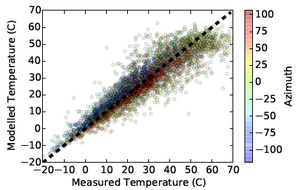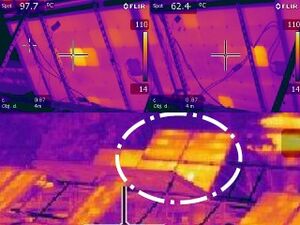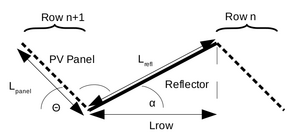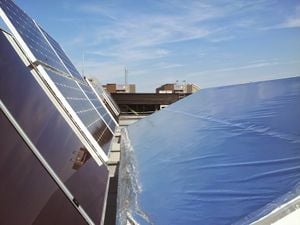
Non-tracking planar concentrators are a low-cost method of increasing the performance of traditional solar photovoltaic (PV) systems. This paper presents new methodologies for properly modeling this type of system design and experimental results using a bi-directional reflectance function (BDRF) of non-ideal surfaces rather than traditional geometric optics. This methodology allows for the evaluation and optimization of specular and non-specular reflectors in planar concentration systems. In addition, an outdoor system has been shown to improve energy yield by 45% for a traditional flat glass module and by 40% for a prismatic glass crystalline silicon module when compared to a control module at the same orientation. When compared to a control module set at the optimal tilt angle for this region, the energy improvement is 18% for both system. Simulations show that a maximum increase of 30% is achievable for an optimized system located in Kingston, ON using a reflector with specular reflection and an integrated hemispherical reflectance of 80%. This validated model can be used to optimize reflector topology to identify the potential for increased energy harvest from both existing PV and new-build PV assets.
Discussion[edit | edit source]


See also[edit | edit source]

- Photovoltaic system performance enhancement with non-tracking planar concentrators: Experimental results and BDRF based modelling
- Low level concentration for PV applications
- Effects of low concentration planer concentrators on array-scale solar photovoltaic systems performance
- Geographic potential of shotcrete photovoltaic racking: Direct and low-concentration cases
- Zytech - doing LCPV
In the news[edit | edit source]
- Shining More Light on Solar Panels - Michigan Tech News, ECN Magazine, Phys.org, Science Codex, Nanowerk, R&D Magazine, Innovations Report, Chem Europe, Lab Manager Magazine, Solar Daily, Michigan Ag Connection, EWAO, Planet Energy News
- Solar Panels Can Produce More Energy Through New Technique - Science World Report
- Una nuova tecnica per potenziare i pannelli solari: potranno produrre il 30% di energia in più - Tiscali Scienza(Italy)
- Fotovoltaico, gli scienziati aggiungono un 30% all’energia in uscita - Rinnovabili (Italy)
- Raising solar panel system output by 30% - Market Business News
- Study Shows Reflectors Could Maximize Solar Panels Productivity - AZO Cleantech
- New Method Enables Use of Reflectors to Shine More Light on Solar Panels - World Industrial Reporter
- Solar Panels Just Got a Little Bit Brighter - The Epoch Times
- Boosting solar panel efficiency: Is it simply a matter of angles? -- EE Times Europe
- http://www.eetindia.co.in/ART_8800716755_1800008_NT_d79964a0.HTM - EE Times India
- 研究人员利用双向反射模型提高PV聚光效率 - 电子工程专辑 -- EE Times China
- Researchers Discover How to Shine More Sunlight on Solar Panels, Increase Output By 30% - IHS Electronics 360
- Light reflection model boosts solar farm efficiency - Smart 2 Zero
- Forma fácil de aumentar el rendimiento de paneles solares ya instalados - Noticias de la Ciencia (Spanish)
- 研究人员利用双向反射模型提高PV聚光效率 - Laoyaobo (Chinese)
- Hallan modo de aumentar eficiencia de paneles solares -- Presna Latina (official state news agency of Cuba/Spanish),Primer Momento (Dominican Republic /Spanish)
- Zusatzreflektor steigert Ausbeute bei Solaranlagen -- Elektor Magazine (Germany)
- Michigan Tech research team aim to increase sunlight reaching solar panels, may improve output by 30%- PV Buzz
- US researchers aim to improve use of reflectors for solar plants - Photon
- Hallan modo de aumentar eficiencia de paneles solares - Pais Distinto Press (Spanish/Dominican Republic)
- Výzkum zvýšení efektivity solárních panelů - FCC Public (Czech)
- Fotovoltaico, 30% di efficienza energetica in più sfruttando il sole perso fra i pannelli - Elettronica (Italian)
- More Realistic Modeling for More Efficient Solar Farms - Solar Novus Today
- Video games and action movies help crank up solar PV output - Electric Business
- Shining More Light on Solar Panels Opli Magazine (Israel)
- ---
- Can mirrors boost solar panel output - and help overcome Trump’s tariffs? -The Conversation-6045, EIN - Solar Energy Industry Today -78k, IEN, LA Times 771, Sioux City Journal, Skagit Valley Herald, Albany Times Union 32.9k, Idaho Press Tribune, LaCrosse Tribune 95.7k,Bozeman Daily Chronicle, Prosyscom Tech News,Phils Stock World, phys.org 7774, Tucson 36.2k, Globe Gazette, SanFrancisco Chronicle 1392, Renewable Energy World 66.5k, Chicago Tribune (2173), Lompoc Record, ECS, Business Insider 311, Green Building Advisor guest blog 71623
- Can mirrors boost solar panel output? Green Technology Magazine
- Un miroir peut-il augmenter la performance des panneaux solaires PV? Ecohabitation
- Using reflectors to increase the yield of solar panels Eco Home
- Solar energy hack Radio NZ





